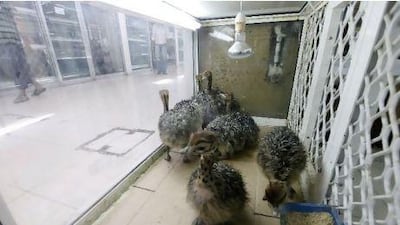SHARJAH // Despite countless warnings from experts about the dangers of keeping wild animals as pets, they are still easily available if you know where to look.
Posing as tourists, within just 20 minutes of walking into the Sharjah Animal and Bird Souq, reporters from The National were offered a five-month-old white tiger cub for Dh35,000.
"I can get you the baby tiger by Friday," the Pakistani shopkeeper said after being asked for something a little more unusual as a pet.
Kneeling on the ground to feed dozens of green parrot chicks in a cardboard box, he added: "It's from a breeder, a white tiger, very beautiful, very cute."
It was not, he claimed, dangerous or aggressive. "It has all the injections from the vet but will cost you Dh35,000. It comes with all the documents and paperwork you need, like a passport, but that will cost you Dh300 extra.
"Don't worry about the police. It's not illegal."
All commercial trade in tigers or their parts has been banned since 1987 under the Convention on International Trade in Endangered Species of Wild Fauna and Flora (Cites).
Tigers are listed as an Appendix I species, which is an animal threatened with extinction. The World Wildlife Fund estimates that there are 3,200 tigers left in the wild. A breeder of any animal under Appendix I must have a genuine certificate from Cites stating that the parent animal is registered under the convention and can be verified by authorities in the UAE.
"There is a lot of illegal activity going on across the world regarding this kind of breeding," said Dr Reza Khan, Dubai Municipality's wildlife and zoo specialist.
"Each Appendix I animal that is being bred in captivity must have a unique ID number that is stored globally among member countries and can be traced very quickly."
Back in the Sharjah souq, the Pakistani man's cramped shop was filled with pigeons, parrots and other squawking ornamental birds in cages. He said he could also get lion cubs - but not immediately, as it depended on when they were bred.
"I'm not sure when, but they are very tame. You can hold them and stroke them like a normal cat. They don't bite or scratch," he said.
Walking around the other shops, our reporters also spotted a hooded one-year-old falcon for sale for Dh15,000 sitting on a perch behind a cage of brightly coloured canaries.
There was even a small stingray swimming in a fish tank and on sale for Dh280.
"It's from Thailand and it's the only one we have," said the Indian shopkeeper. "We've had it for about 15 days. It's a freshwater stingray, it's perfectly legal here. It's the saltwater variety that is banned," he said.
He proffered a plastic tub of fish food. "Just feed it this stuff twice a day and it's not a problem," he said.
Most shopkeepers were far more suspicious when asked about the sale of exotic animals.
"I don't sell them but you could try the shop four doors down," said one worker when asked where a baby crocodile could be bought.
Dr Khan said fewer people were keeping wild animals as pets than before, but it remained a serious problem. He said unsuspecting owners could be exposing themselves to diseases such as hepatitis and rabies, as well as the threat of spontaneous attacks.
Many wild animals were traded through the UAE before the country signed up to Cites.
The UAE signed the agreement in 1974, withdrawing between 1988 and 1990. A federal law that included the Cites treaty was passed in 2002 and in 2008 an Arabic list of prohibited species was distributed to officials.
Kevin Budd, the assistant operations manager at the Sharjah Breeding Centre for Endangered Arabian Wildlife, said the authorities and airline companies were working to control the trade through airports and to ensure any animal shipments passing through the UAE meet all the international and national requirements.
The result is that bringing animals in by air is risky. An Emirati man was arrested in a Bangkok airport last week after two leopards were discovered in his suitcase. Two more leopards, a gibbon, a marmoset and a bear were found in a bag nearby.
However, "people may be able to come through other channels", said Dr Khan, by bringing animals through the desert and by boat from countries including Somalia, Djibouti, Sudan and Egypt.
The most common wild animals kept as pets in the Emirates include lions, tigers, gorillas, chimps, baboons, snakes, Nile crocodiles and cheetahs.
Mr Budd said demand was fed by availability. "These species also have specific dietary and behavioural requirements, which non-professionals may not fully appreciate," he said.
The centre has also received animals with their claws and teeth removed by their owners.
"These are wild animals and are in no way domesticated; at any time they may attack the owners, their family, their friends or neighbours."
melshoush@thenational.ae

